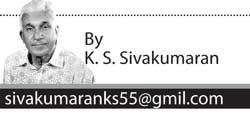18 Jan 2020 - {{hitsCtrl.values.hits}}

 We now have a strict disciplinarian as our President. It is unlikely that the presidential form of governance would be abolished. Setting up an ‘Upper House’ to prevent or delay hasty legislation and having a restricted number of ministers would never happen. The Cabinet of Ministers is welcome, but non-Cabinet Ministers specialising in particular fields of engagement are vital. We could have 25 such junior ministers with lesser salaries thereby saving a lot of expenses. Only educated, hardworking and professionally-efficient people should be appointed as ministers and junior ministers. The elected premier executes legislature and advises the President on deliberations. The responsibilities of the Cabinet Secrecy and all ministers and junior ministers should function in unison. Duly-elected MPs, both from the ruling party and the opposition, should be virtuous men and women who have knowledge on contemporary world affairs. They should be trilingual or at least bilingual. The perks and privileges should be minimised to save money so that we could settle heavy debts.
We now have a strict disciplinarian as our President. It is unlikely that the presidential form of governance would be abolished. Setting up an ‘Upper House’ to prevent or delay hasty legislation and having a restricted number of ministers would never happen. The Cabinet of Ministers is welcome, but non-Cabinet Ministers specialising in particular fields of engagement are vital. We could have 25 such junior ministers with lesser salaries thereby saving a lot of expenses. Only educated, hardworking and professionally-efficient people should be appointed as ministers and junior ministers. The elected premier executes legislature and advises the President on deliberations. The responsibilities of the Cabinet Secrecy and all ministers and junior ministers should function in unison. Duly-elected MPs, both from the ruling party and the opposition, should be virtuous men and women who have knowledge on contemporary world affairs. They should be trilingual or at least bilingual. The perks and privileges should be minimised to save money so that we could settle heavy debts.
It is the President who has power and authority, but the supremacy of the House of Representatives is paramount because people elect such members. The President too is elected by people, but to carry out visionary plans, he could be a benevolent despot with consultation of MPs.
For any government, there should be a vibrant opposition which is a shadow Cabinet that points out rationally when the government goes wrong. It should support everything beneficial to the people. People are intelligent and political conscious, but most of them lack knowledge in various fields. They should be educated in the right manner to understand the changes taking place worldwide.
Our little island has people of various origins. We have minute differences in culture. We are dubbed as majority and minority communities only by taking numerical strength. After all, we are all human beings. It is an accident of birth that we are born to a particular community. Even before colonial times, we have learnt to be parochial. We have never thought to be citizens of one nation. There are several reasons for this including geographical location.
A majority of people happens to worship Lord Buddha after the visit of the son of Emperor Asoka, Mahinda and his sister Sanghamitta during the reign of King Devanampiya Tissa. Buddhist philosophy was born out of North Indian form of Hinduism which appealed to both Sinhalese and Tamils. The Pancha Seela, Eight Precepts and Five Precepts were all noble truths. In Sri Lanka, it is Saivism that is practised by many Tamils. So we have a Sinhala Buddhist country with a quarter number of people who are neither Sinhalese nor Buddhists but citizens. They should be treated well if we truly follow the wisdom of Siddhartha, the noble philosopher. We are then citizens and integrated members of one nation. The ethnic policy of the government should not be narrowed down. After all, diversity is always better than alienation.
27 Apr 2024 2 hours ago
27 Apr 2024 2 hours ago
27 Apr 2024 3 hours ago
27 Apr 2024 4 hours ago
27 Apr 2024 4 hours ago